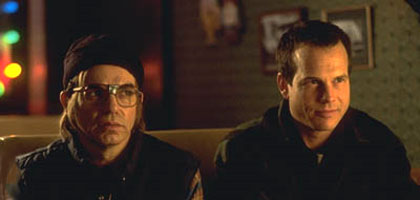
Cash landing
Film of the Month: A Simple Plan

Sam Raimi's A Simple Plan may resemble other recent small-town crime films, but its emotional power and subtlety put it in a class of its own, argues Philip Kemp
Early on in A Simple Plan, a man cautiously enters the fuselage of a crashed plane. The pilot is sitting in his seat, his head shaking as if in pain or incredulity. Thinking he's still alive, the newcomer speaks to him and starts forward. His movement causes the fuselage to tip, lurching him forward into the pilot - the crows that have been feeding on the dead man's face erupt in a tumult of angry squawks and stabbing beaks.
It's easy to guess how the Sam Raimi we know and love, splatter-happy director of The Evil Dead, Army of Darkness, Darkman and The Quick and the Dead, would have built on that scene. Easy to imagine the in-your-face shocks, the crow-haunted nightmares, the vengeful zombie with a half-eaten visage chewing its way up the cast list. The humour would have been gleefully ghoulish, the characters and violence pure cartoon, the genre conventions teased and twanged and mercilessly mocked. But A Simple Plan is the work of a very different Sam Raimi, a film-maker who here austerely rejects hyped-up camera tricks and jokey shock effects and creates living, complex characters whose fates we care about. The result is easily his finest film to date.
The subtlety and the pervasive sense of unease are matched from the start by Danny Elfman's insidious score (hailed by Paul Tonks in Gramophone magazine as "the most daringly original score from Hollywood in years"). Like Raimi, Elfman has come a long way from his cartoonish beginnings (a frequent Tim Burton collaborator, he scored the first two Batman films and A Nightmare Before Christmas). Here, he sets up the chill, edgy mood with an off-key duet between detuned piano and banjo, like a distorted reflection of small-town rural values; they're joined by an eerie ensemble of flutes, alto through bass. By the time the three men (Bill Paxton, Billy Bob Thornton and Brent Briscoe) stand beside the wrecked plane, debating what to do with the stash of loot fallen literally from the sky, there's little doubt where we're headed. Things are already going badly wrong, and they're going to get worse.
The corrosive effect of an ill-gotten windfall on ordinary lives is no new theme, of course (Shallow Grave, to look no further), and the use of bleak, near-monochrome Minnesota snowscapes - in fact shot in Wisconsin, since the Minnesota winter turned disobligingly mild - inevitably recalls the Coen brothers' Fargo. But Raimi's film never feels derivative, thanks not least to the strongly individualised performances he's drawn from his lead actors. Paxton proves once again that he's one of the most underrated (and understated) actors in Hollywood, his Hank a "nice, sweet, normal guy" horrified to find himself sucked down to disaster by one brief capitulation to his own worse instincts. As his brother Jacob, Thornton gives a masterfully gauged portrait of a man whose emotional insights - which are as acute as anybody's - are constantly wrong-footed by his mental limitations. His performance is all the more moving for never lapsing into the sentimentality that tinged his similar role in Sling Blade. Only Bridget Fonda, as Hank's wife Sarah, doesn't quite come together as a character - not the actress' fault but the script's since it requires her to switch a little too abruptly from moral revulsion to all-out avidity.
But A Simple Plan shares with Fargo something more than a use of rural winter backdrops: its stern, absolute morality, as starkly black and white as crows against a snowfield. An alternative title, in fact, might have been that of the film which gave Paxton his previous best role: One False Move. Hank's single moment of weakness, allowing himself to be persuaded by the less-grounded Jacob and their third accomplice Lou (Briscoe) instead of holding out for integrity, leads with horrifying inexorability into the abyss, making their destruction complete. Utterly different in tone as Raimi's earlier films may have been, they held in common with this latest work a sense of the fearful flimsiness of everyday normality. Just one rent in the fabric of things and darkness is let loose.
But while the plot moves with inevitable momentum to its dénouement, it's far from predictable. Central to the film's dramatic impact is the way its moral centre shifts, quite unexpectedly, from Hank to Jacob. To begin with Hank clearly occupies the moral high ground: he's honest Mr Normal, the guy we identify with, while Jacob's eager venality aligns him with the shiftless Lou. When Lou describes the cash as, "the American Dream in a goddam gymbag", Hank retorts (a touch pompously), "You work for the American Dream, you don't steal it." But as Hank embarks on his slow slide into perdition, it's Jacob, a seemingly gormless figure with his protruding teeth and cheap taped-up glasses, who takes on the role of conscience. By the time he asks, "Hank, d'you ever feel evil? I do", he is confronting the questions his brother is desperately trying to evade.
The key point of transition is the scene when Hank, blackmailed by Lou to hand over some of the cash, comes to persuade his brother to help him gain counter-leverage by framing Lou. As the scene progresses it emerges that for all his slowness of brain, Jacob's scruples are finer than Hank's. Where Hank sees Lou as a contemptible lowlife against whom any tactics are justified, Jacob sees a friend he is being asked to betray. His distress as Hank piles on the pressure is pitiable, and he gives in only when offered the one bribe he can't resist: that Hank will help him regain their father's farm.
Before Raimi took it on, A Simple Plan was to have been directed by John Boorman. (A scheduling conflict with The General obliged him to withdraw.) It may well have been this transfer of moral stature that attracted Boorman to the project; one can imagine the film as a snowbound counterpart to Boorman's Deliverance, another study of everyday guys destroyed by a headlong train of events, and of an individual's self-image (Jon Voight then, Paxton now) fractured and degraded under pressure. But Raimi makes the film his own, carrying over from his previous work the sense of encroaching paranoia as formerly solid ground starts to give way beneath the feet and the avenues of escape are blocked off one by one.
Scott B. Smith, scripting from his own novel, charts his characters' descent into hell with remorseless control and impeccable narrative logic. At each step it's made clear how, at that panic-stricken moment and with no benefit of hindsight, these people could hardly have done other than they did. With each turn of the screw the options narrow down, until Hank, broken and weeping, a gun in his hand, finds himself forced into committing the final, lethal act of destruction. His grief is the more lacerating since by doing so he shatters the only thing to emerge from the grim events, a new-found closeness to his formerly estranged brother.
A Simple Plan is bookended by Hank's voice-over. At the outset he reflects how, despite the dullness of his daily round, a man like him should feel blessed in having "a wife he loves, a decent job, friends and neighbours who respect him." At the end, looking back on the betrayals and deaths, the ambitions raised and crushed, the ruin of that modest measure of contentment, he muses sombrely: "There are days when I manage not to think of anything at all. But those days are few and far between." There's more unbearable anguish in those few spare words than in all the gore and mayhem of Raimi's previous output.
